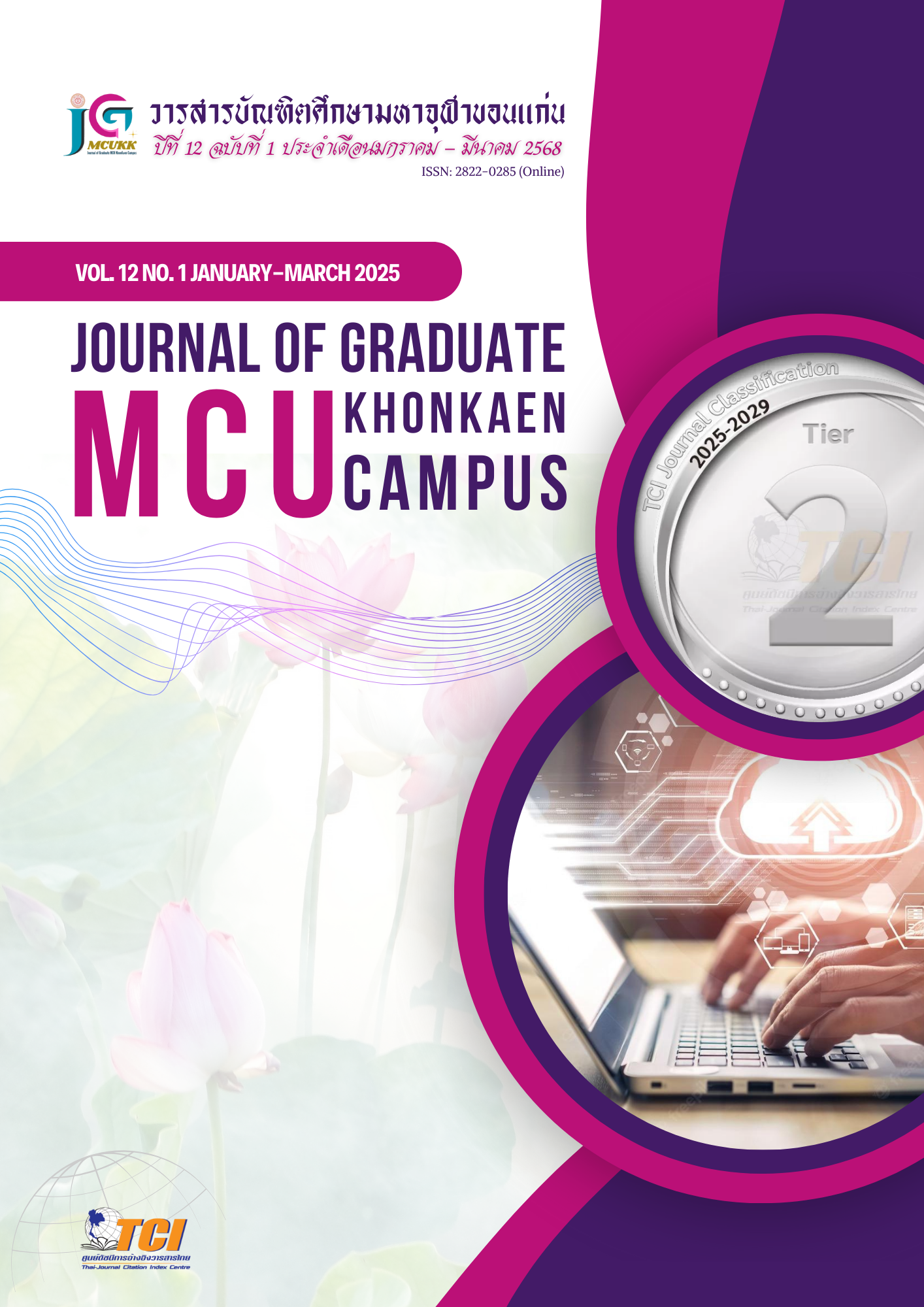Design and Development of an Educational Board Game Based on the Philosophy of Sufficiency Economy to Enhance Financial Literacy for Upper Primary Students
Main Article Content
Abstract
This research aimed to 1) analyze and explore stakeholders' perspectives, 2) design and develop a prototype educational board game, and 3) evaluate and reflect on the effectiveness of the prototype board game based on the Philosophy of Sufficiency Economy, in enhancing financial literacy for upper primary students. The target group included school directors, teachers, parents, upper primary students, and board game designers. The research instruments consisted of semi-structured interviews, consumer model frameworks, problem analysis tools, design principles documentation, an educational board game, and a financial literacy assessment. Qualitative data were analyzed using content analysis, while quantitative data were analyzed using the Wilcoxon Signed-Rank Test.
The result of this research findings
1) Stakeholders' perspectives: Teachers require clear and practical teaching materials that align with students' abilities and fit the context of small schools with limited resources. Students prefer engaging and game-based learning that connects to real-life situations, making understanding financial literacy and sufficiency economy principles more straightforward. School directors seek assessment tools to measure students' understanding and application of sufficiency economy principles for sustainable curriculum integration. Parents want enjoyable learning experiences for their children that foster financial literacy and real-life applications.
2) Board game design principles follow the framework by Suwimon Wongwanich, which includes Goals, Arguments, Design Intervention, Intervention. This structured approach ensured the board game's clarity, logical foundation, and alignment with real user needs, covering content, learning processes, and expected outcomes.
3) Effectiveness assessment revealed a statistically significant difference between pre-test and post-test financial literacy scores at the 0.05 significance level, confirming that the board game effectively enhanced students' financial literacy skills.
Article Details

This work is licensed under a Creative Commons Attribution-NonCommercial-NoDerivatives 4.0 International License.
References
กมลชนก สกนธวัฒน์ และ ชาริณี ตรีวรัญญู. (2563). การพัฒนาชุดกิจกรรมการเรียนรู้ทางเศรษฐศาสตร์โดยใช้แนวคิดการเรียนรู้แบบฉากทัศน์เป็นฐาน เพื่อส่งเสริมความฉลาดรู้การเงินของนักเรียนมัธยมศึกษาตอนต้น. วารสารศิลปากรศึกษาศาสตร์วิจัย, 12(2), 34-52.
ธนาคารแห่งประเทศไทย. (29 พฤศจิกายน 2565). ผลสำรวจทักษะทางการเงินของคนไทย ปี 2565. https://www.bot.or.th/th/research-and-publications/articles-and-publications/bot-magazine/Phrasiam-67-2/2567-info-financial-skill.html
สุวิมล ว่องวาณิช. (2563). การวิจัยการออกแบบทางการศึกษา. สำนักพิมพ์จุฬาลงกรณ์มหาวิทยาลัย.
อภิสิทธิ์ไล่ ศัตรูไกล. (2557). SERVICE DESIGN WORKBOOK คู่มือการออกแบบบริการ. ศูนย์สร้างสรรค์งานออกแบบ.
Amonhaemanon, D., & Isaramalai, S. (2020). Boosting financial literacy: The roles to enhance quality of life. ABAC Journal, 40(1), 85-108.
Balasubramnian, B., & Sargent, C. S. (2020). Impact of inflated perceptions of financial literacy on financial decision making. Journal of Economic Psychology, 80, 102306.
Bandura, A. (1977). Social Learning Theory. Englewood Cliffs, NJ: Prentice-Hall.
Channak, A., Chai-Aroon, T., Jiawiwatkul, U., & Lertwatchara, K. (2022). Understanding the financial literacy of undergraduate students at Thai universities. Journal of Business & Finance Librarianship, 27(2), 67-80.
Chen, S.-Y., Tsai, J.-C., Liu, S.-Y., & Chang, C.-Y. (2021). The effect of a scientific board game on improving creative problem solving skills. Thinking Skills and Creativity, 41, 100921. https://doi.org/10.1016/J.TSC.2021.100921
Edmonds, W. A., & Kennedy, T. D. (2017). An applied guide to research designs: Quantitative, qualitative, and mixed methods.
Kuo, H., Weng, T.-L., Chang, C.-C., & Chang, C.-Y. (2023). Designing Our Own Board Games in the Playful Space: Improving High School Student’s Citizenship Competencies and Creativity through Game-Based Learning. Sustainability. https://doi.org/10.3390/su15042968
Kuzma, I., Chaikovska, H., Levchyk, I., & Yankovych, O. (2022). Formation of financial literacy in primary school students. Journal on Efficiency and Responsibility in Education and Science, 15(3), 142-155.
Lusardi, A., & Messy, F.-A. (2023). The importance of financial literacy and its impact on financial wellbeing. Journal of Financial Literacy and Wellbeing, 1(1), 1-11.
McKenney, S., & Reeves, T. (2018). Conducting educational design research. Routledge.
Pysmennyi, V. (2024). The Influence of Economic Board Games on the Development of Cognitive and Social Skills in Pupils and Student Youth. Problems of Education. https://doi.org/10.52256/2710-3986.1-100.2024.16
Stolper, O. A., & Walter, A. (2017). Financial literacy, financial advice, and financial behavior. Journal of business economics, 87, 581-643.
Tiing, C. W. H., & Yunus, M. M. (2021). Board Games in Improving Pupils’ Speaking Skills: A Systematic Review. Sustainability. https://doi.org/10.3390/su13168772
Xiao, J. J., & Porto, N. (2017). Financial education and financial satisfaction: Financial literacy, behavior, and capability as mediators. International Journal of Bank Marketing, 35(5), 805-817.

